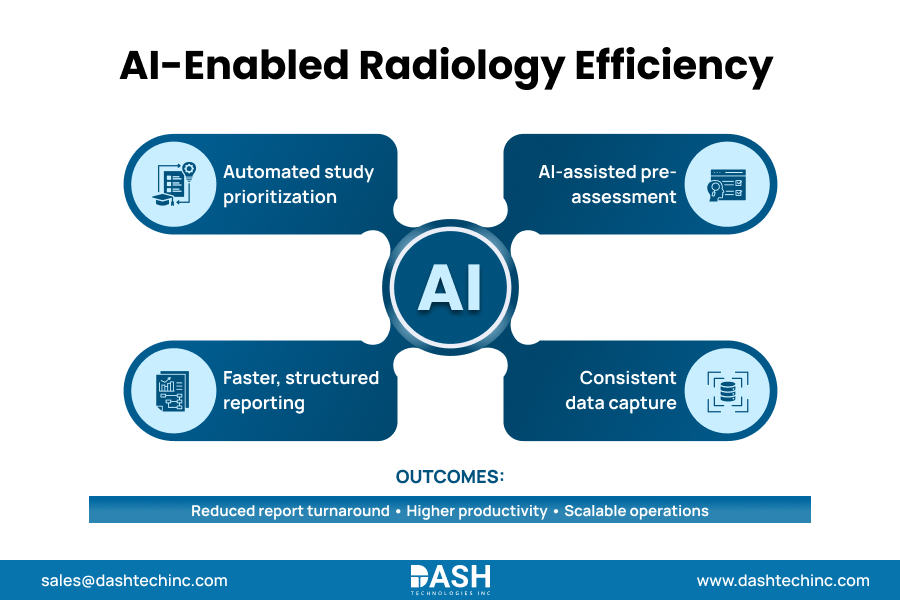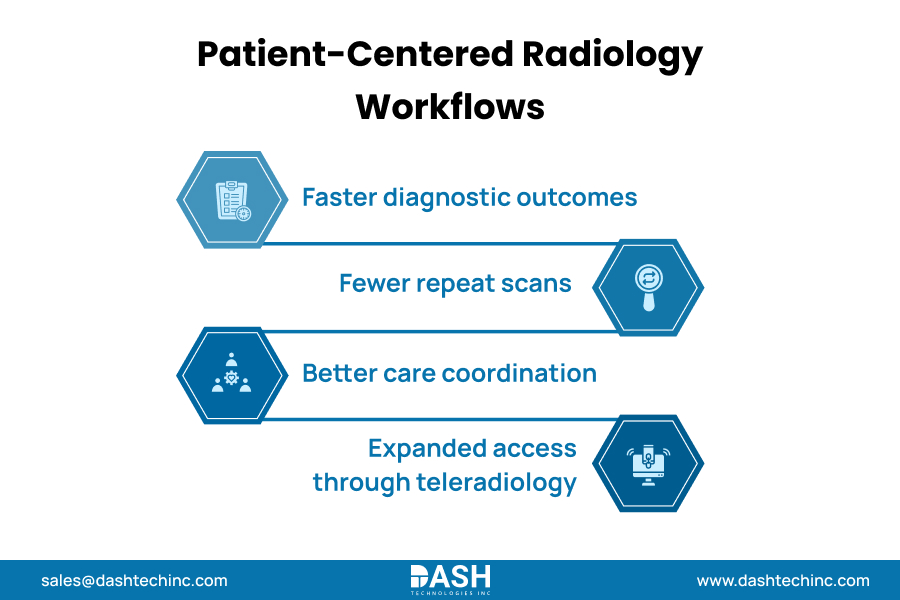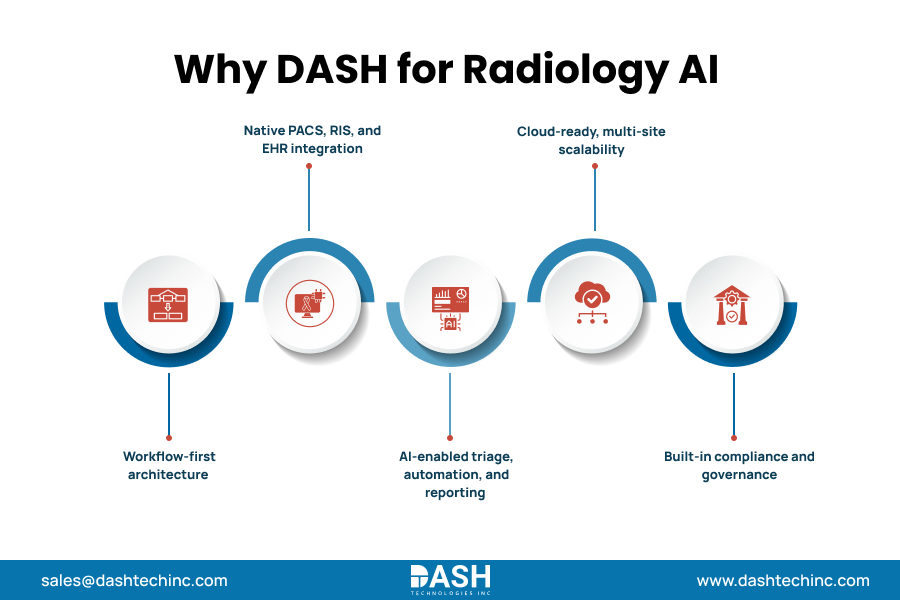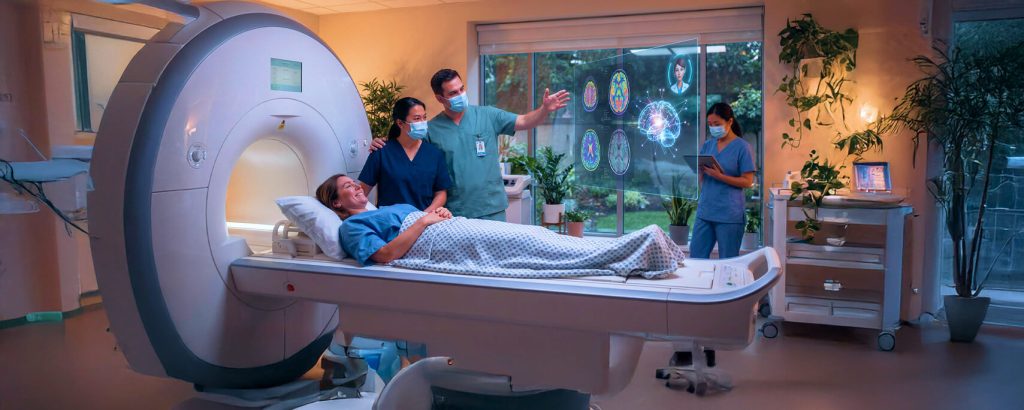AI in Radiology Workflow: Boosting Efficiency, Accuracy, and Patient-Centered Care
Radiology departments are facing unparalleled stress. Why? Escalating imaging volumes, growing case complexity, expectation of quicker turnaround time from radiology teams, and precision in outcomes – all these demands, frequently with disjoined systems and constrained personnel.
We are aware of how the initial discussions around AI in radiology emphasized image analysis – but the true change in shaping radiology is now occurring in a different area: radiology end-to-end workflows.
The main question is—how AI-driven workflow automation transforms radiology operations – that covers everything from patient appointment and examination scheduling to case prioritization, reporting, and outcome delivery.
When AI is integrated properly—it not only assists radiologists but helps change the outlook of the radiology department. It facilitates quicker diagnosis, operational effectiveness, and improved patient-centered care on a larger scale.
The Operational Challenges in Modern Radiology
For AI to generate value, it must tackle the challenges that radiology teams encounter daily. Key challenges consist of:
Disjoined systems: PACS, RIS, and EHR platforms often operate in silos, forcing manual handoffs and duplicate data entry.
Reporting delays and manual case routing: Cases are manually assigned; urgent ones may not be prioritized immediately, and reporting processes continue to require considerable effort.
Radiologist exhaustion: Administrative demands, increasing workloads, and frequent context switching lead to fatigue.
Long turnaround times: Delayed reports impact downstream clinical decisions and adversely affect patient experience.
For CIOs, radiology directors, and operations leaders, the objective has evolved beyond merely AI-supported diagnosis to complete workflow transformation
Radiology, Reimagined
Unify PACS, RIS, EHR, and AI to reduce turnaround time, improve accuracy, and scale imaging—securely.
View SolutionsWhat AI in Radiology Means Today: A Workflow-Centric View
AI in radiology has expanded beyond just image analysis algorithms. Currently, its most significant influence stems from coordinating the movement of work within the imaging ecosystem.
AI in the radiology workflow involves applying machine learning, automation, and smart coordination to enhance the scheduling, interpretation, reporting, and distribution of imaging studies throughout clinical systems.
This includes:
- AI-based case prioritization and triage
- Smart worklist management
- Automated anomaly detection to support image interpretations
- Automated documentation and structure reporting
- Seamless integration across PACS, RIS, and EHR systems
When AI is integrated throughout the workflow—not added as a separate tool—it becomes clinically applicable, operationally expandable, and trusted by healthcare teams
How AI Improves Efficiency in Radiology Operations

Improvements in radiology efficiency arise not from increased speed but from eliminating obstacles.
Key workflow enhancements enabled by AI:
Automated study allocation: Imaging examinations are allocated in real-time according to urgency, type, subspecialty, and the availability of radiologists.
AI-driven pre-assessment: Key insights are highlighted promptly, guaranteeing that urgent cases prioritize the worklist.
Accelerated reporting via structured templates: AI-driven documentation shortens dictation duration and enhances report uniformity.
Uniform data collection: Automation reduces the need for redoing tasks due to absent or inconsistent data.
Business results:
- Decreased time for report completion
- Enhanced productivity without increasing personnel
- Expandable operations across various sites
How AI Enhances Diagnostic Accuracy Within the Workflow
AI improves precision not by substituting radiologists—but by aiding superior decision-making in high-stress situations.
Advantages of workflow-level accuracy:
- AI-powered identification of irregularities: Algorithms pinpoint problematic areas, aiding radiologists in directing their attention to the most critical regions.
- Uniformity in interpretations: Standardized processes minimize differences among readers and locations.
- Minimized supervision in busy settings: AI serves as an additional pair of eyes, particularly during heavy work periods.
- Human-in-the-loop verification: Radiologists retain oversight, confirm results, and ensure clinical responsibility.
The outcome is a more secure, dependable diagnostic procedure—intended to enhance knowledge, not substitute it.
Enabling Patient-Centered Care Through Workflow Intelligence

Radiology processes have a direct—and frequently undervalued—effect on patient experience.
When AI optimizes processes, patients gain advantages by:
- Accelerated outcomes, facilitating swifter clinical choices
- Reduced number of repeat scans due to improved data quality and collaboration.
- Enhanced continuity of care among various departments and care teams.
- Increased availability via tele-radiology and remote interpretation frameworks.
Intelligent workflows enhance radiology teams’ ability to provide care that is timely, well-coordinated, and centered on the patient, reducing wait times and improving communication.
AI in Radiology Workflow: Real-World Use Cases
1. AI-Based Case Triage
Automatically prioritizes stroke, trauma, and other critical findings for immediate review.
2. Intelligent Worklist Automation
Dynamically assign studies based on urgency, modality, subspecialty, and resource availability.
3. Structured Reporting Automation
Standardized templates accelerate documentation while supporting compliance and quality benchmarks.
4. Interoperability-Driven Routing
AI-enabled orchestration across PACS, RIS, and EHR ensures seamless data flow and clinical visibility.
5. Analytics and Workflow Optimization
Predictive insights identify bottlenecks, forecast workloads, and optimize staffing and resource utilization.
How DASH Enables AI-Driven Radiology Workflow Transformation

Dash approaches AI in radiology differently—workflow first, not algorithm first.
Our radiology workflow solutions are designed to make AI clinically usable by embedding intelligence directly into daily operations.
What sets DASH apart:
- Workflow-first architecture, not isolated AI tools
- Seamless PACS, RIS, and EHR integration
- Support for AI-driven triage, automation, and reporting
- Cloud-ready platforms for multi-facility environments
- Built-in compliance, scalability, and clinical governance
We don’t just implement AI—we engineer radiology workflows that allow AI to deliver real-world value.
Best Practices for Implementing AI in Radiology Workflows
Successful AI adoption requires more than technology.
Key considerations:
- Interoperability planning across imaging and clinical systems
- Data governance and compliance, aligned with healthcare regulations
- Radiologist engagement and training to ensure adoption and trust
- Continuous performance monitoring to refine and scale workflows
Organizations that treat AI as a workflow strategy—not a software add-on—see faster ROI and stronger clinical alignment.
Conclusion: Impact of AI in Radiology Workflow
We all know that AI in radiology is no longer an option—but the true value merges when integrated into interoperable and intelligent workflows.
Healthcare organizations can achieve enhanced accuracy, faster diagnoses, reduced burnout, and improved patient-centered care
By transforming how imaging operations run end to end, healthcare organizations can achieve faster diagnoses, improved accuracy, reduced burnout, and more patient-centered care.
Ready to build AI-ready radiology workflows?
Explore how Dash’s Radiology Workflow Solutions can transform your imaging operations—or connect with our experts to design workflows that make AI work in the real world.
Frequently Asked Questions
About Dash

Dash Technologies Inc.
We’re technology experts with a passion for bringing concepts to life. By leveraging a unique, consultative process and an agile development approach, we translate business challenges into technology solutions Get in touch.







